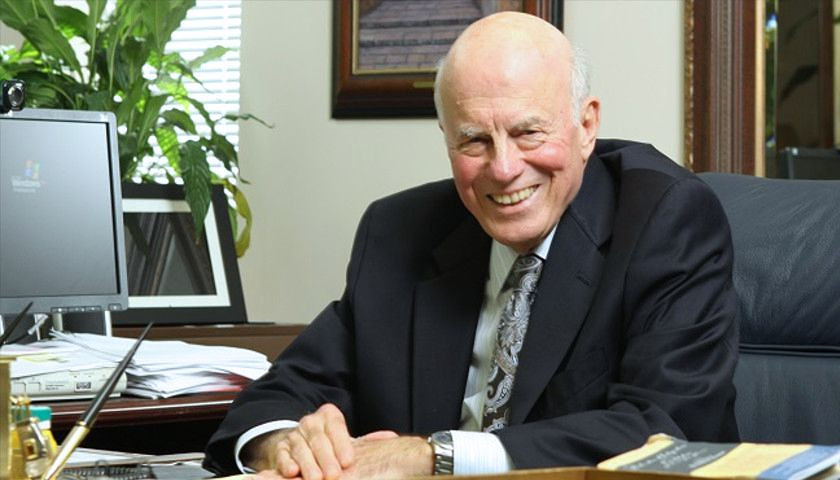by Richard A. Viguerie, ConservativeHQ.com Chairman
As the establishment Republican Party’s Capitol Hill leaders continue to fumble – many would say block – the agenda that elected Donald Trump and built a new and winning conservative – populist political coalition, the mutterings for the formation of a third political party to compete with the Democratic and Republican establishments has grown louder.
As I explained in my book TAKEOVER, the ideological incentive for conservatives to bolt the Republican Party seems to grow every time weak and feckless GOP “leaders” hold sway on Capitol Hill – but the political reasons to resist it are overwhelming:
Because of the weakness of the Republican National Committee and the GOP leadership on Capitol Hill, plenty of conservatives then [1970s], as now, were inclined to leave the Republican Party, at least for a while.
Every time the establishment GOP would “me-too” the Democrats, or strong-arm conservatives in Congress or Republican Party politics, some conservatives would contemplate forming a third party.
This conservative disillusionment with the GOP wasn’t new, as I’ve mentioned before; it went back at least to the 1950s and early 1960s, when a vehement group of libertarian-minded thinkers, such as author Ayn Rand, argued for a separate movement, while William F. Buckley Jr. argued for a conservative takeover of the Republican Party.
Goldwater had to swat down the idea of a third party, telling conservatives at the 1960 Republican National Convention to grow up and concentrate on taking over the Republican Party.
Some conservatives had even urged Ronald Reagan to run as a third-party conservative candidate. During the 1970s I found plenty of reason to support these efforts, and I was certainly fed up enough with the failures of the Republican establishment to bolt the Republican Party myself.
This effort gathered so much steam that a group of conservatives convened a meeting in Washington to urge Reagan to leave the Republican Party, launch “a full-blown national conservative movement,” and run as a third-party candidate.
To his great credit, Reagan chose not to pursue that path.
Reagan’s answer to those, including some of his good political supporters, who wanted him to head this new conservative party, was to tell them “they were out of their minds.”
As Reagan saw it then (and he was right) the bulk of conservative voters in America are Republicans—and they won’t desert the Republican Party for a third party. Reagan understood that if he was ever going to make progress in accomplishing the things he believed in, it would have to be within the Republican Party.
This is why, while I considered myself to be first and foremost a limited-government constitutional conservative, I operate, then and now, within the Republican Party. Although dealing with the “dime store Democrat” leadership of the national Republican Party was often a hard pill for those associated with the New Right to swallow, we concluded that the path to electing conservative candidates was not to form a third party; it was to become a “third force” to conceive and advance conservative ideas, and elect conservative candidates through the Republican Party.
We thought of ourselves—not the establishment Republican Party—as the alternative to the Left and the Democrats…
To those naysayers who still argue for a third party instead of a third force, let me say simply that I’ve been there out of the same frustration you have, and with that experience I can prove that what I’m advocating can work—and did work—to elect Ronald Reagan. We of the New Right shared the conservative ideas of the “Old Right,” but, as I’ve described [in TAKEOVER], we were operationally different.
We began by having a new attitude toward politics. We understood the premise that “successful politicians do not bore the voters.” We used the new and alternative media to bypass the establishment media, get our message out, and excite voters with our ideas. Gone was the notion that conservative ideas were or should be self-evident to voters. Gone, too, was the perennial losers’ attitude held by many old time conservatives, and especially by Republicans on Capitol Hill and in the state capitols. We got up every morning thinking: What are the two, three, or four things we can do today to defeat the Democrats and put liberals out of business?
Today, we see the same kind of energy that the New Right brought to Republican politics in the 1960s, 1970s and 1980s being generated by the conservative – populist coalition that elected President Trump.
This has created a new “fourth force” in American politics that is outside the two establishment political parties and the usual right-left third forces, and that’s President Donald J. Trump and his populist legions.
In the case of the relationship between conservatives and the Trump White House it is well to remember O’Sullivan’s First Law, named for John O’Sullivan, former editor of National Review: Any institution that is not explicitly (and actively) right wing will become left wing over time.
During the 1970s and 1980s we of the New Right weren’t operating as an appendage of the GOP; we were working through it in the spirit of the biblical injunction in the book of Romans to be in the world, but not of the world.
We weren’t even operating as supporters of any individual candidate, even though eventually all of us who were active in the New Right came to support Ronald Reagan for president.
We saw ourselves as separate from the established Republican Party. Our goal was to promote a set of conservative principles and values and to back candidates who would stand for those values and principles, if that meant opposing the established leaders of the Republican Party – and Republican Presidents like Richard Nixon, Jerry Ford and the Bushes – so be it.
The policy of acting as a fourth force worked well to defeat appointed establishment Republican Senator Luther Strange in the Alabama Republican Primary and nominate Judge Roy Moore – even though it meant defying President Trump’s call to support Senator Strange, the appointed incumbent.
We have many more fourth force opportunities to take over the Republican Party to make it the political home of limited government constitutional conservatives, let’s not blow it with talk of a third party.
Reprinted with permission from ConservativeHQ.com.






I like “William F. Buckley Jr. argued for a conservative takeover of the Republican Party”
One round of elections for both the House and Senate and the “old GOP” would have to form their party
The cold hard truth is that being a part of the Republican party is akin to being an abused housewife to a disloyal husband. Actions always speak louder than words. For conservatives to settle for a Reagan once in two generations to abrogate decades of passivity or outright betrayal in the face of the enemy is insulting. The GOP is beyond saving or redemption. The beginnings of the Federalist party are promising and worth supporting.